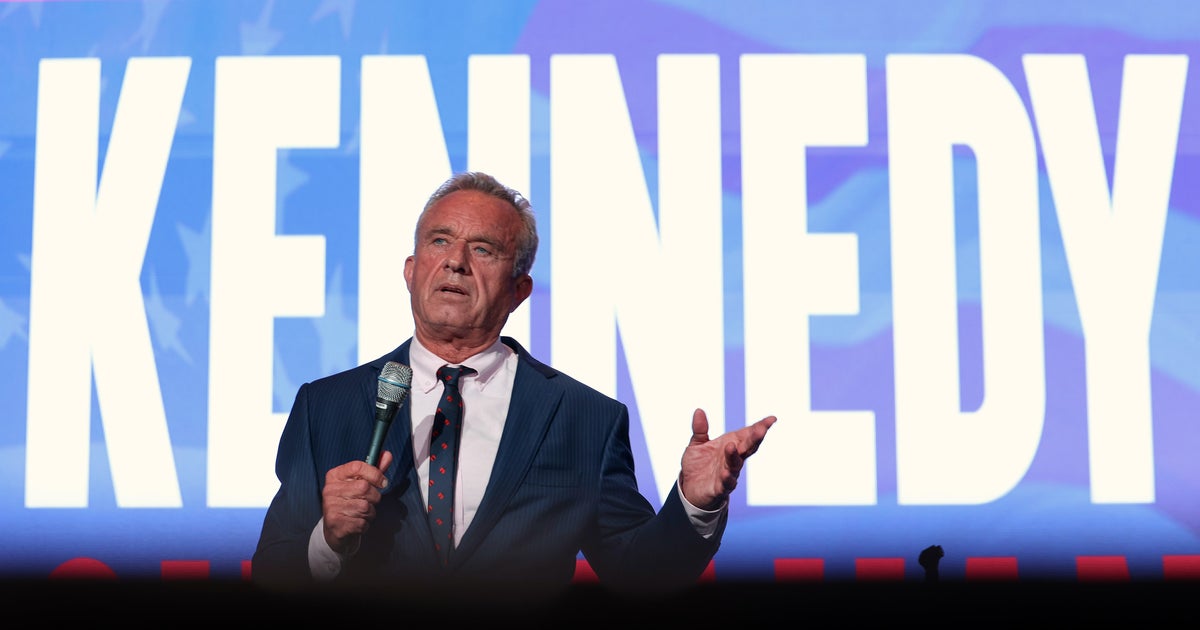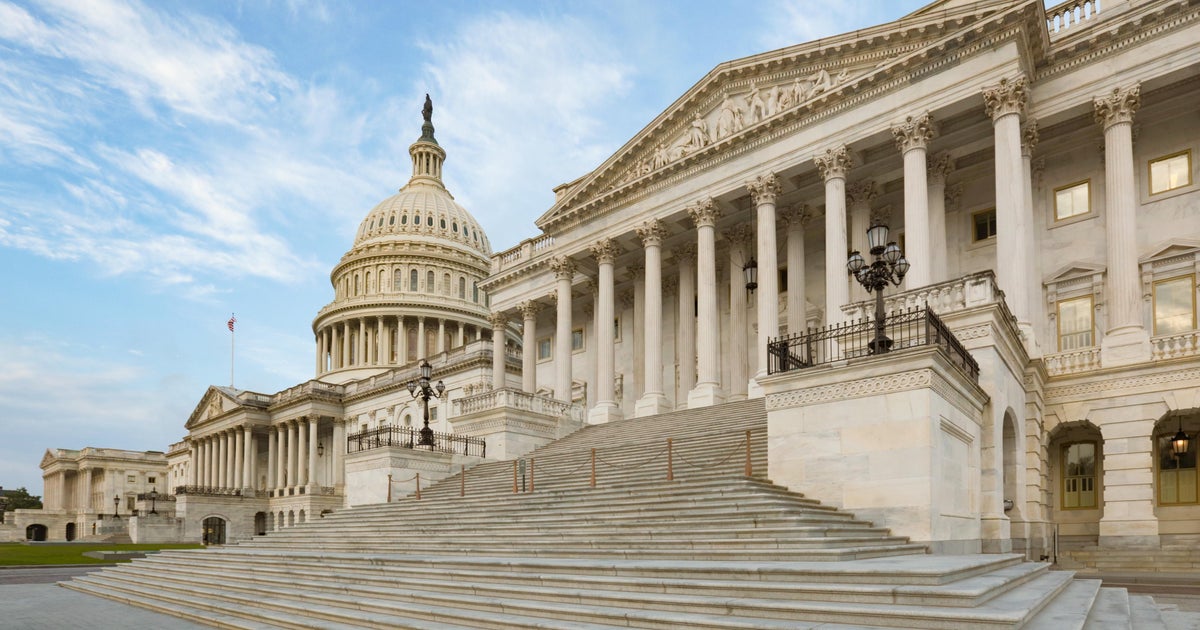CBS News
Democrats and their allies sue to keep RFK Jr. off the ballot in several states

As independent presidential candidate Robert F. Kennedy Jr. ramps up efforts to secure ballot access in all 50 states, he faces stiff resistance from Democratic political opponents attempting to block his November election bid with multiple lawsuits.
Kennedy vowed to be on the ballot in every state by the end of July. With just over a month to go, he’s made it on the ballot in five states: Utah, Michigan, Delaware, Oklahoma and Tennessee. But Kennedy is also facing legal challenges in five states — Nevada, New York, North Carolina, Delaware and New Jersey. In some of those states, he’s submitted signatures for ballot access. Several of his political opponents say they’re not finished filing lawsuits against him, calling him a spoiler candidate who will likely throw the election in former President Trump’s favor.
“RFK Jr. was recruited to run by MAGA Republicans; is being propped up by Trump’s largest donor; and his own campaign staff has said their goal is to hurt President Biden,” said Matt Corridoni, a spokesperson for the Democratic National Committee. “He has no real grassroots support, no pathway to 270 electoral votes, and his campaign is resorting to a pattern of deception and shortcuts to circumvent state rules for independent candidate ballot access.”
The DNC pledged to continue its efforts to challenge Kennedy’s ballot access efforts “and make sure that he is playing by the rules.”
The latest legal challenge against Kennedy comes from election lawyer Scott Salmon, a Democrat not affiliated with any outside group, who wants to keep Kennedy off the New Jersey ballot under the state’s “sore loser law,” which prohibits candidates from mounting an independent run after a failed bid for a major party nomination. The statute says that among those banned would be candidates who have been “a member of a political party at any time after the immediately preceding primary election for the general election,” or who “unsuccessfully sought the nomination of a political party to such position in the primary election.”
Kennedy decided to run as an independent last October, dropping his Democratic primary bid. A New Jersey court will hear arguments in the case next month, on July 17.
Salmon said he is using his own savings to carry out the challenge against Kennedy because “it’s the right thing to do.”
In Nevada, a key battleground state narrowly won by President Biden in 2020, the Nevada Democratic Party helped coordinate a lawsuit filed Thursday to keep Kennedy off the ballot. The court filing argues that Kennedy’s affiliation with multiple minor parties in other states violates Nevada’s ballot access laws for independent candidates.
Kennedy has claimed ballot access in multiple states through an assortment of third parties. He won the nomination of the American Independent Party in California, the Independent Party in Delaware, the Natural Law Party in Michigan, the Reform Party in Florida, the Alliance Party in South Carolina, and his own We the People Party in North Carolina and Hawaii.
“The State of Nevada has set up a reasonable process for placing candidates on the ballot. RFK Jr.’s campaign has not met the requirements necessary to run as an Independent non-affiliated party candidate in our state,” said Hilary Barrett, the Nevada Democratic Party executive director.
According to the Nevada secretary of state’s office, Kennedy has not yet filed a petition with the state. He is waging his own legal challenge against the Nevada secretary of state’s office and began circulating a new petition for signatures after he was informed that his first petition was invalid.
And in Delaware, the state Democratic Party alleges that the Independent Party failed to file certificates of nomination for Robert F. Kennedy Jr. and his running mate, Nicole Shanahan, within 10 days of nominating them at the party’s convention on January 23.
Kennedy announced Shanahan as his running mate in March, about two months after Kennedy’s nomination in the state. In a letter to Delaware Election Commissioner Anthony Albence, an attorney representing the state Democratic Party asked Albence to block their certification, and any other Independent Party candidate running for president in the state.
A super PAC called Clear Choice Action, aimed at stopping any third-party or independent candidates from making it to the November election, is leading similar efforts to keep Kennedy off the ballot by filing objections in New York and North Carolina.
Kennedy’s campaign faces 13 challenges from Democratic groups in New York, including one challenge filed by the Democrat-aligned super PAC in June. Clear Choice claims Kennedy used an incorrect address on his New York petition and that many of the signatures submitted are illegible or from New Yorkers who are not registered to vote.
In North Carolina, the super PAC alleges that We The People, Kennedy’s own party, which submitted signatures for ballot access in May, violated North Carolina election laws by misleading signers into believing they were directly petitioning to place Kennedy on the ballot instead of creating a new political party that can subsequently hold a nominating convention. The state’s Board of Elections is set to meet Wednesday to review the objection.
“We have a very strong legal team, one of the most motivated legal teams to defend every ballot petition lawsuit we’re receiving from the DNC, its PACs aligned with the DNC that are undermining democracy, in my opinion, to try to keep us off the ballot,” Shanahan said on Thursday during an interview with Elex Michaelson in response to the lawsuits.
“But regardless, we love democracy and we’re fighting tooth and nail for it,” she added.
CBS News
Davos Interviews – CBS News

Watch CBS News
Be the first to know
Get browser notifications for breaking news, live events, and exclusive reporting.
CBS News
Social Security Fairness Act clears key Senate hurdle, heads to final vote

Legislation to expand Social Security benefits to millions of Americans cleared a key hurdle in the U.S. Senate on Wednesday afternoon and is now headed toward a final vote.
Senators voted 73-27 to approve a motion to proceed with consideration of the Social Security Fairness Act, according to an unofficial Senate tally shown in a webcast on the floor of the chamber.
“We will vote on taking up the Social Security Fairness Act to repeal flawed policies that eat away at the benefits of those who’ve worked as teachers, firefighters, postal workers, or public sector workers,” Senate Majority Leader Chuck Schumer said on social media shortly before the procedural vote. “Retirees deprived of their hard-earned benefits will be watching closely.”
The New York Democrat has pushed to bring the measure up for a full vote, which would eliminate two federal policies that prevent million of Americans, including police officers, firefighters, postal workers, teachers and others with a public pension from collecting their full Social Security benefits.
“Social Security is a bedrock of our middle class. You pay into it for 40 quarters, you earned it, it should be there when you retire,” Ohio Senator Sherrod Brown, a Democrat who lost his seat in the November election, told the chamber ahead of Wednesday’s vote. “All these workers are asking for is for what they earned.”
Sen. Thom Tillis spoke against measure, saying that while a small percentage of people are not getting what they should from Social Security, enacting what he framed as an unfunded government mandate that would increase the federal deficit “is not the way to fix it.”
“This bill will take $200 billion during the 10-year period out of the Social Security trust fund without any way to pay for it,” the North Carolina Republican added.
What is the Social Security Fairness Act?
Decades in the making, the Social Security Fairness Act would repeal two federal policies — the Windfall Elimination Provision (WEP) and the Government Pension Offset (GPO) — that broadly reduce payments to nearly 3 million retirees.
That includes those who also collect pensions from state and federal jobs that aren’t covered by Social Security, including teachers, police officers and U.S. postal workers. The bill would also end a second provision that reduces Social Security benefits for those workers’ surviving spouses and family members. The WEP impacts about 2 million Social Security beneficiaries and the GPO nearly 800,000 retirees.
“This stuff takes time, but 21 years is ridiculous,” said Brown of the process. The Senate held its first hearings into the policies in 2003.
The measure, which passed the House in November, had 62 cosponsors when it was introduced in the Senate last year. Yet the bill’s bipartisan support eroded some in recent days, with some Republican lawmakers voicing doubts due to its cost. According to the Congressional Budget Office, the proposed legislation would add a projected $195 billion to federal deficits over a decade.
At least one GOP senator who signed onto similar legislation last year, Sen. Mike Braun of Indiana, said he was still “weighing” whether to vote for the bill. “Nothing ever gets paid for, so it’s further indebtedness, I don’t know,” Braun said last week, the Associated Press reported.
“In the end it’s going to come down to individual members are going to make their own decisions about where they want to come down on that,” incoming Republican leader John Thune said at a press conference Tuesday. “Obviously I am concerned about the long-term solvency of Social Security and that is an issue I think we need to address.”
Without Senate approval, the bill’s fate would end with the current session of Congress, and would need to be re-introduced in the next Congress.
CBS News
Behind the House Ethics decision to release the Matt Gaetz misconduct report

Watch CBS News
Be the first to know
Get browser notifications for breaking news, live events, and exclusive reporting.







